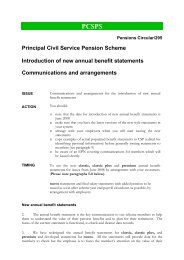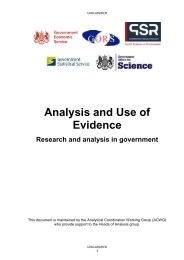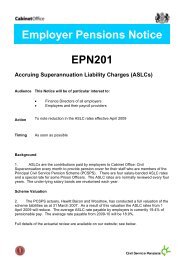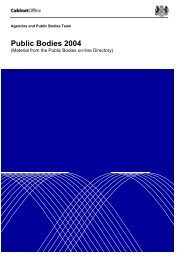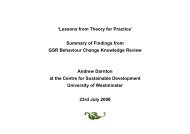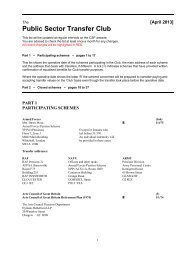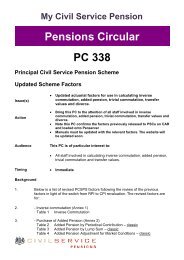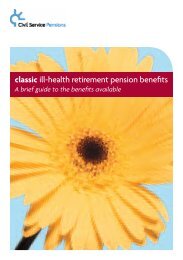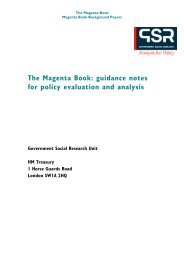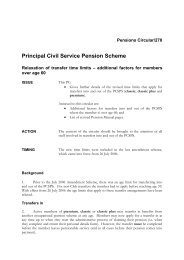nuvos ill-health retirement pension benefits - The Civil Service
nuvos ill-health retirement pension benefits - The Civil Service
nuvos ill-health retirement pension benefits - The Civil Service
You also want an ePaper? Increase the reach of your titles
YUMPU automatically turns print PDFs into web optimized ePapers that Google loves.
<strong>nuvos</strong> <strong>ill</strong>-<strong>health</strong> <strong>retirement</strong> <strong>pension</strong> <strong>benefits</strong>A brief guide to the <strong>benefits</strong> available
This booklet tells you about the <strong>pension</strong><strong>benefits</strong> that we may pay if you areeligible for <strong>ill</strong> <strong>health</strong> <strong>retirement</strong>.It does not cover every aspect. <strong>The</strong> fulldetails are contained only in the rules,which are the legal basis of the scheme.Nothing in this booklet can override therules. In the event of any difference, therules w<strong>ill</strong> apply.Who are ‘we’?This booklet is produced by CabinetOffice, which manages the scheme.However, <strong>pension</strong> records are held byyour MyCSP Pension <strong>Service</strong> Centre onbehalf of organisations that operate <strong>Civil</strong><strong>Service</strong> <strong>pension</strong>s, and not by CabinetOffice. Your MyCSP Pension <strong>Service</strong>Centre w<strong>ill</strong> work out the amount of<strong>pension</strong> if you retire because of <strong>ill</strong><strong>health</strong>. However, they do not decidewhether or not you are eligible for <strong>ill</strong><strong>health</strong> <strong>retirement</strong>; this is decided by youremployer on the adviceof the schememedical adviser. If you would like moreinformation after you have read thisbooklet, please contact your employerin the first instance.Contact details for your MyCSP Pension<strong>Service</strong> Centre can be found on thewebsite:www.civilservice.gov.uk/<strong>pension</strong>sNote: Where we have had to use technical terms, weshow them in bold and explain them at the back of thebooklet.2
Qualifying conditions and applying for an<strong>ill</strong> <strong>health</strong> <strong>pension</strong>What are the qualifyingconditions?You usually need to have worked foran employer that offers <strong>Civil</strong> <strong>Service</strong><strong>pension</strong>s (CSP) for at least two yearsbefore you can qualify for an <strong>ill</strong> <strong>health</strong><strong>pension</strong>. However, you may qualify ifyou transferred <strong>benefits</strong> in from anotheroccupational <strong>pension</strong> scheme or havean earlier period of service with a CSPemployer.You must have suffered a permanentbreakdown in <strong>health</strong> involving incapacityfor employment. In this context‘permanent’ means until you reach<strong>pension</strong> age.<strong>The</strong>re are two levels (tiers) of <strong>pension</strong>depending on the degree of yourincapacity to work.Lower tierTo qualify for a lower tier <strong>pension</strong> youmust, in the opinion of the schememedical adviser, be permanentlyincapable of doing your own or acomparable job.Upper tierTo qualify for an upper tier <strong>pension</strong>you must, in the opinion of the schememedical adviser, be permanentlyincapable of any gainful employment.How do I apply for an <strong>ill</strong> <strong>health</strong><strong>pension</strong>?Either you or your employer can startthe application process for <strong>ill</strong> <strong>health</strong><strong>retirement</strong>, but your employer mustfirst investigate whether there are otheroptions which w<strong>ill</strong> enable you to carryon working. If you wish to apply for <strong>ill</strong><strong>health</strong> <strong>retirement</strong>, you must ask youremployer who w<strong>ill</strong>, in turn, ask you tocomplete a form. <strong>The</strong> form w<strong>ill</strong> askyou to give permission for the schememedical adviser to contact your doctorand any other medical specialists whohave been involved in your care.Your employer w<strong>ill</strong> pass the form on tothe scheme medical adviser along withinformation about your job, the detailsthey hold about your <strong>ill</strong> <strong>health</strong> andyour sickness absence record. For moreinformation about the assessment3
procedures please see the ‘Ill HealthRetirement Guide for Members’ on thewebsite:www.civilservice.gov.uk/<strong>pension</strong>sunder publications.Can I appeal against the medicaladviser’s decision?Yes, you can appeal but there aretime limits. Ask your employer or yourMyCSP Pension <strong>Service</strong> Centre forinformation about the appeal process.You w<strong>ill</strong> normally need new medicalevidence to support your appeal.4If <strong>ill</strong> <strong>health</strong> <strong>retirement</strong>is granted<strong>The</strong> scheme medical adviser w<strong>ill</strong> send acertificate to your employer, confirmingthat you have met the conditions for<strong>ill</strong> <strong>health</strong> <strong>retirement</strong>. <strong>The</strong> certificate w<strong>ill</strong>also recommend which tier applies. Youremployer w<strong>ill</strong> then set the <strong>retirement</strong>date, including any period of notice.<strong>The</strong> date can not be before the datethe scheme medical adviser issues thecertificate.Your MyCSP Pension <strong>Service</strong> Centrew<strong>ill</strong> send you an estimate to show thelevel of <strong>pension</strong> <strong>benefits</strong> you can expectto get. <strong>The</strong>y w<strong>ill</strong> also ask you to f<strong>ill</strong> in aPersonal Details Form so that they cancheck that the information on your<strong>pension</strong> record is correct. Your MyCSPPension <strong>Service</strong> Centre w<strong>ill</strong> not be ableto give authorisation to the <strong>pension</strong>payroll provider to pay your <strong>pension</strong>until you have returned the PersonalDetails Form. You should note that HMRevenue & Customs require your <strong>nuvos</strong><strong>pension</strong> to be tested against the LifetimeAllowance before it is paid. your MyCSPPension <strong>Service</strong> Centre w<strong>ill</strong> thereforealso ask if your total <strong>pension</strong> income,
including any other <strong>pension</strong>s, may beabove £50,000 a year. <strong>The</strong>re is moreinformation on this in the booklet “Your<strong>pension</strong> and tax” which you can get fromyour MyCSP Pension <strong>Service</strong> Centre.Alternatively,you can find the booklet onthe website:www.civilservice.gov.uk/<strong>pension</strong>sYour <strong>pension</strong> w<strong>ill</strong> consist of:• the total <strong>pension</strong> you have built up todate plus all the rises in line with thecost of living• any added <strong>pension</strong> you have bought,provided that you did not opt to buyit shortly before you are retired• any <strong>nuvos</strong> <strong>pension</strong> have bought bytransferring <strong>benefits</strong> from another<strong>pension</strong> arrangement, unless you areretired within two years of bringingin the transfer and we consider thatyou did not disclose a known <strong>health</strong>condition at that time• any <strong>nuvos</strong> <strong>pension</strong> you have boughtby a Club transfer. <strong>The</strong> value of thetransfer w<strong>ill</strong> be reduced if the schemewhich you transferred it from had a<strong>pension</strong> age below 65• any linked <strong>pension</strong> you havetransferred from an earlier periodof service with an organisation thatoperates <strong>Civil</strong> <strong>Service</strong> <strong>pension</strong>s.(If the linked <strong>pension</strong> is from one ofthe <strong>Civil</strong> <strong>Service</strong> final salary schemes,it w<strong>ill</strong> be reduced to reflect the factthat it was based on a <strong>pension</strong> ageof 60.)Do I get a tax-free lump sum?You can choose to give up some of your<strong>pension</strong> in return for a cash lump sum.This w<strong>ill</strong> be tax free, subject to limits setby HM Revenue and Customs. You w<strong>ill</strong>be able to see the maximum lump sumyou can take on your <strong>pension</strong> estimate.You do not have to take the maximum.To help you work out how much youwould like to take, use the lump sumcalculator on the <strong>Civil</strong> <strong>Service</strong> website:www.civilservice.gov.uk/<strong>pension</strong>sYou need to remember that you w<strong>ill</strong>have to give up £1 of your <strong>pension</strong> foreach £12 of lump sum you want to take.5
When w<strong>ill</strong> I get my first payment?If you choose to have a lump sum, the<strong>pension</strong>s payroll provider w<strong>ill</strong> send it tothe bank or building society account youput on your Personal Details Form. <strong>The</strong><strong>pension</strong>s payroll provider w<strong>ill</strong> pay yourlump sum as quickly as possible, althoughno particular date can be promised. Itw<strong>ill</strong> normally be paid within a few days ofyour leaving date if the <strong>pension</strong> payrollprovider has received the informationin good time. You should complete andreturn your Personal Details Form andany other information promptly.Pensions are normally paid monthly inarrears (at the end of the period in whichthey are due). Your <strong>pension</strong> paymentsw<strong>ill</strong> be made by direct credit to youraccount. This ensures that your bankaccount is credited on the day eachpayment is due.For more information on how the <strong>pension</strong>is paid and to find details of the <strong>pension</strong>spayroll provider, see Appendix A.What if I am too <strong>ill</strong> ever to workagain?If you meet the criteria for an upper tier<strong>pension</strong> your MyCSP Pension <strong>Service</strong>Centre w<strong>ill</strong>, in most cases, enhance(increase) your <strong>pension</strong> as if you hadcontinued to work to 65. <strong>The</strong>y w<strong>ill</strong>work out the enhancement by dividingyour <strong>pension</strong> by the number of yearsyou were contributing to <strong>nuvos</strong>, andmultiplying that amount by the numberof years from your date of <strong>retirement</strong>to your 65th birthday. However, your<strong>pension</strong> cannot be more than 75% ofyour <strong>pension</strong>able earnings, which maylimit the amount of enhancement youreceive.ExampleGerard has to retire on <strong>ill</strong> <strong>health</strong> termsat the age of 55 after 20 years in <strong>nuvos</strong>.His <strong>pension</strong> at that point is £7,500 a year.<strong>The</strong> scheme medical adviser confirmsthat Gerard is unlikely to be able to workagain, so his <strong>pension</strong> is enhanced by£3,750 (£7,500/20 x 10), giving him a total<strong>nuvos</strong> <strong>pension</strong> of £11,250 a year.6
Do my dependants get anenhanced <strong>pension</strong>?Your dependants’ <strong>pension</strong>s w<strong>ill</strong> beworked out in the normal way, so ifyou receive an upper tier <strong>pension</strong>, any<strong>pension</strong>s for your dependants followingyour death w<strong>ill</strong> be worked out byreference to your enhanced <strong>pension</strong>.However, the amount of enhancementmay be limited so that the <strong>pension</strong>s foryour dependants would not be greaterthan those which would have beenpayable if you had died in service. <strong>The</strong>reis more information about dependants’<strong>pension</strong>s in the booklet ‘<strong>nuvos</strong> <strong>retirement</strong><strong>benefits</strong>’ which you can get from ourwebsite.What if I become too <strong>ill</strong> to workafter I have already drawn part ofmy <strong>pension</strong> on partial <strong>retirement</strong>terms?If you have already drawn part of your<strong>pension</strong> on partial <strong>retirement</strong> terms youmay be retired on <strong>ill</strong> <strong>health</strong> terms butyou w<strong>ill</strong> receive only a lower tier <strong>ill</strong> <strong>health</strong><strong>pension</strong>, even if you meet the criteria foran upper tier <strong>pension</strong>.Are there special arrangements ifI am terminally <strong>ill</strong>?If you are terminally <strong>ill</strong>, with a medicallyassessed life expectancy of less than 12months, you can apply to exchange your<strong>pension</strong> <strong>benefits</strong> for a lump sum, to bepaid immediately. <strong>The</strong> lump sum w<strong>ill</strong> befive times your <strong>pension</strong>. This w<strong>ill</strong> notaffect how any dependants’ <strong>pension</strong>s areworked out. However, you should thinkcarefully before choosing to exchangeyour <strong>pension</strong> for a lump sum on thesespecial terms, and you may wish to takefinancial advice. <strong>The</strong> total amount of<strong>pension</strong> and lump sum available to youand your dependants may be higher ifyou do not opt for these special terms.You should note that if you are are-employed <strong>pension</strong>er or on partial<strong>retirement</strong>, the lump sum w<strong>ill</strong> notinclude any <strong>pension</strong> already in payment.What if I die shortly after <strong>ill</strong><strong>health</strong> <strong>retirement</strong>?If you die within five years of starting totake your <strong>pension</strong>, and have not optedto exchange your <strong>pension</strong> for a lumpsum under the special terms for terminal7
<strong>ill</strong> <strong>health</strong> as described above, the schemew<strong>ill</strong> pay a lump sum representing thebalance of five years’ <strong>pension</strong> (includingany added <strong>pension</strong> you had bought) tothe person or people you have named.ExampleGerard has been diagnosed as terminally<strong>ill</strong>, so he can apply to take a lump sum of£56,250 (5x 11,250) instead of his <strong>pension</strong>.He opts to take his <strong>pension</strong> in the usualway and chooses to take the maximumamount of tax free cash, £48,214. Thisleaves him with an annual <strong>pension</strong> of£7,232.When he dies 6 months later theamount of death benefit lump sumworks out as £32,544 (5 years’ <strong>pension</strong> of£7,232 per year less 6 months’ <strong>pension</strong>taken).I have a provisional <strong>pension</strong>award. What does this mean?If the scheme medical adviser is unableto decide whether or not the nature ofyour incapacity meets the criteria for a<strong>pension</strong>, they may make a provisionalaward at whichever tier is the mostappropriate to your condition at thetime. If your award is provisional, thescheme medical adviser w<strong>ill</strong> also statewhen they w<strong>ill</strong> review it. This can beany time up to five years from theaward decision. At the time of review,the scheme medical adviser w<strong>ill</strong> eitherconfirm the original award or changeit. If the scheme medical adviserrecommends your <strong>pension</strong> should bereduced or removed, the <strong>pension</strong>spayroll provider w<strong>ill</strong> give you threemonths’ notice before they changeyour <strong>pension</strong> payments. If the schememedical adviser recommends anincrease in your <strong>pension</strong>, the <strong>pension</strong>spayroll provider w<strong>ill</strong> backdate theincreased payments to the date of thereview.Can I appeal against the schememedical adviser’s decision toreduce a provisional <strong>pension</strong> orupper tier <strong>pension</strong>?Yes, you may do so; though note thatthere are time limits. You should askthe <strong>pension</strong>s payroll provider forinformation about the appeal process.You w<strong>ill</strong> normally need new medicalevidence to support your appeal.8
Does my <strong>pension</strong> carry onfor life?If your <strong>pension</strong> is lower tier and is notprovisional, it w<strong>ill</strong> continue for the restof your life.If you receive an upper tier <strong>pension</strong> thescheme medical adviser w<strong>ill</strong> reviewyour case every five years or any timeup to five years as they recommend.This is called a periodical review. If yourcondition improves so that you nolonger meet the conditions for an uppertier <strong>pension</strong>, we w<strong>ill</strong> reduce your <strong>pension</strong>to the lower tier. <strong>The</strong> <strong>pension</strong>s payrollprovider w<strong>ill</strong> give you three months’notice before they reduce your <strong>pension</strong>.Your <strong>pension</strong> w<strong>ill</strong> not be reduced belowthe lower tier rate even if you makea complete recovery. We w<strong>ill</strong> stopreviewing your <strong>pension</strong> once you reach<strong>pension</strong> age.we do not expect you to be fit to bere-employed.If you are re-employed by anorganisation offering the <strong>Civil</strong> <strong>Service</strong><strong>pension</strong> arrangements, your <strong>pension</strong>w<strong>ill</strong> be abated (reduced) if your annualrate of <strong>pension</strong>able earnings and your<strong>pension</strong> together come to more thanyour <strong>pension</strong>able earnings in the twelvemonths immediately before your<strong>pension</strong> came into payment.Further informationYou can find out more informationabout <strong>nuvos</strong> on our website,www.civilservice.gov.uk/<strong>pension</strong>sIf you do not have access to the website,or cannot find what you need to know,you should contact your MyCSP Pension<strong>Service</strong> Centre or, after your <strong>retirement</strong>,the <strong>pension</strong>s payroll provider.What if I am re-employed?If you are receiving a lower tier<strong>pension</strong>, you may be able to rejoin the<strong>Civil</strong> <strong>Service</strong> <strong>pension</strong> arrangements,depending on the rules in force at thetime. If your <strong>pension</strong> is at the higher rate,9
Technical termsAdded <strong>pension</strong> is an amount of extra<strong>pension</strong> that you can buy.Club transfer is a transfer from another<strong>pension</strong> scheme in the Public SectorTransfer Club, such as the NHS PensionScheme.Comparable job means another job inyour grade or pay band, which may bedifferent from the job you have beendoing.Final salary (scheme) is a scheme wherethe <strong>benefits</strong> are generally worked outbased on the member’s final <strong>pension</strong>ableearnings and <strong>pension</strong>able service.Lifetime allowance A limit on the totalvalue of all <strong>pension</strong> <strong>benefits</strong> (except theState <strong>pension</strong>) that you can take withoutpaying additional tax. <strong>The</strong> value of<strong>benefits</strong> is assessed at the time that youtake your <strong>pension</strong>.Linked <strong>pension</strong> is <strong>pension</strong> based onprevious service in the <strong>Civil</strong> <strong>Service</strong><strong>pension</strong> arrangements which you hadchosen to link to your current earnings.MyCSP Pension <strong>Service</strong> Centre holdsyour <strong>pension</strong> record and administersyour <strong>pension</strong> on your employer’s behalf.Your MyCSP Pension <strong>Service</strong> Centreauthorises the <strong>pension</strong>s payroll providerto pay <strong>pension</strong> <strong>benefits</strong>.Partial <strong>retirement</strong> allows you to drawyour <strong>nuvos</strong> <strong>pension</strong> whilst you continueto work for your <strong>Civil</strong> <strong>Service</strong> <strong>pension</strong>semployer. You w<strong>ill</strong> only be allowed to dothis if you have reduced your earnings byat least 20%, for example by moving topart time working or downgrading.Pension age is the earliest age at whichyou can choose to leave and receiveimmediate payment of your <strong>pension</strong>without it being reduced for being paidearly. Pension age in <strong>nuvos</strong> is currently65.Pensionable earnings are earnings thatcould count towards your <strong>pension</strong>. <strong>The</strong>ycan include non-cash items, for example,uniforms or accommodation.Pensions payroll provider is the agentthat pays lump sums and <strong>pension</strong>s onbehalf of <strong>Civil</strong> <strong>Service</strong> Pensions. (SeeAppendix A.)Scheme medical adviser offers guidanceon medical issues relating to <strong>ill</strong> <strong>health</strong><strong>retirement</strong> applications.10
Appendix APension payment process<strong>The</strong> <strong>pension</strong>s payroll provider for <strong>Civil</strong><strong>Service</strong> Pensions is Capita.Capita w<strong>ill</strong> pay the <strong>pension</strong> monthly,on a designated payment date, inarrears. <strong>The</strong>y w<strong>ill</strong> tell you what themonthly payment date w<strong>ill</strong> be, eitherbefore or with the first payment of the<strong>pension</strong>. When a payment date falls ona weekend or an English bank holiday,the payment date w<strong>ill</strong> be the precedingworking day. <strong>The</strong> amount due for part ofa month is worked out proportionatelyaccording to the number of days in thefull <strong>pension</strong> month.Capita w<strong>ill</strong> not send you a monthlypayment advice note; they w<strong>ill</strong> only sendyou an advice note when the amount ofyour <strong>pension</strong> or your tax code changes.<strong>The</strong> note w<strong>ill</strong> show the monthly grossamount payable and the tax that w<strong>ill</strong> bededucted from next month’s payment.<strong>The</strong> net amount may vary slightly due tothe effect of the PAYE tax tables.Capita contact details are:CapitaPO Box 215, Mowden Hall,Darlington,Co. DurhamDL3 9GTTelephone 0870 1699 700Email csp.enquiries@capita.co.ukWhat about income tax?Pensions are assessed as earned income.Capita w<strong>ill</strong> deduct income tax usingthe tax code notified by HM Revenueand Customs. <strong>The</strong> deduction may beprovisional until Capita receives theproper code.Capita has no part is deciding your taxliability or code, so you should direct anyenquiry about your tax code to:<strong>Civil</strong> <strong>Service</strong> PensionsHMRCCustomer Operations PO 4000CardiffCF14 8HRTelephone 0845 300 0627Capita w<strong>ill</strong> send you form P60 each yearto show the amount of <strong>pension</strong> paid andtax deducted in the previous tax year.11
www.civilservice.gov.uk/<strong>pension</strong>sThis leaflet has been produced by MyCSPon behalf of the Cabinet Office.© Crown copyright December 2012Printed by St Ives Direct NIHR




